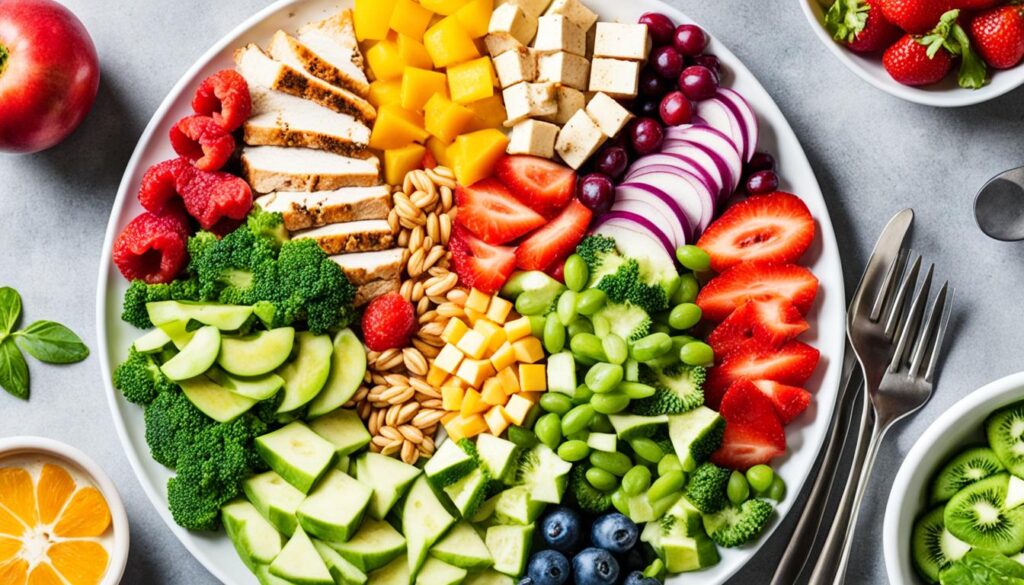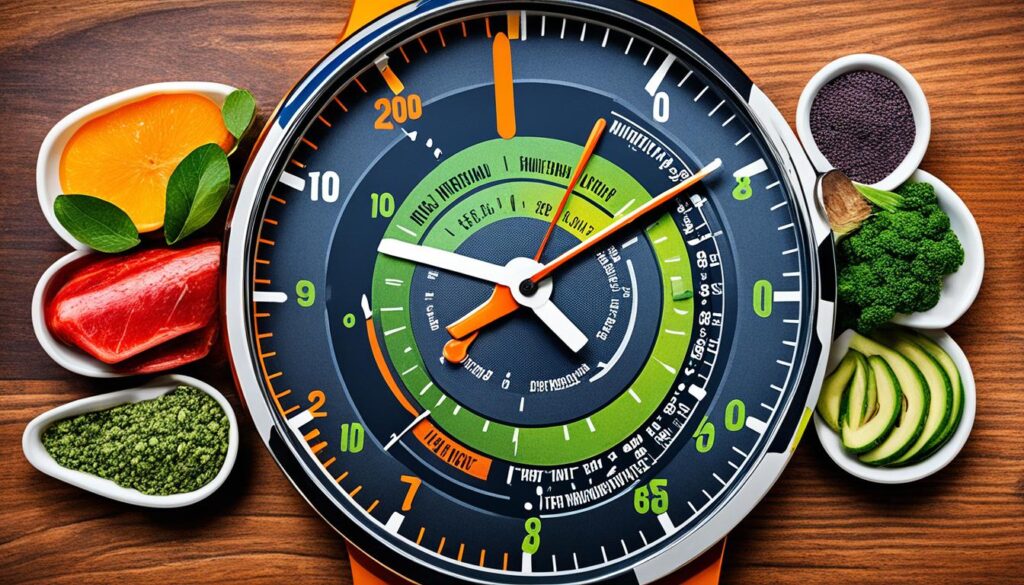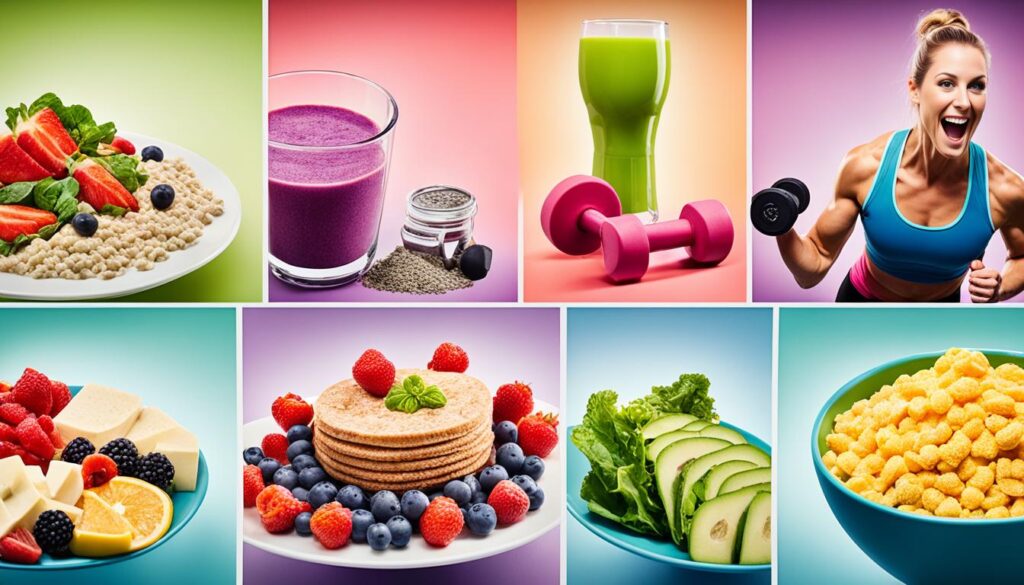Have you ever wondered why some athletes seem to bounce back from intense workouts with renewed energy and muscle strength, while others struggle with fatigue and delayed recovery? The secret could lie in their post-workout nutrition.
Proper post-workout nutrition is essential for replenishing the energy and nutrients depleted during exercise, repairing muscle damage, and supporting the body’s natural recovery process. By fueling your body with the right combination of macronutrients and timing your meals strategically, you can maximize the benefits of your workouts and see faster, more sustainable results. But what exactly should you be eating and when?
Key Takeaways
- The ISSN recommends consuming 20-40 grams of protein every 3-4 hours for optimal exercise performance, muscle recovery, and body composition1
- Endurance athletes should aim for a high-carb diet of 3.6-5.5 grams of carbs per pound of body weight per day to maximize glycogen stores1
- Consuming a combination of protein and carbs within 30 minutes to an hour after exercise can enhance muscle recovery2
- Protein should be consumed within 30-60 minutes after a workout to maximize muscle protein synthesis3
- Proper hydration is essential for post-workout recovery, with the NATA recommending specific water intake guidelines1
Importance of Post-Workout Nutrition
Proper post-workout nutrition is essential for optimal recovery and muscle building. During exercise, your muscles deplete their glycogen stores, which are the primary fuel source for your body4. Additionally, the intense physical stress of a workout can cause micro-tears and damage to the muscle fibers5.
After your workout, your body needs to replenish those glycogen stores and repair the damaged muscle tissue. Consuming the right combination of nutrients in a timely manner can help your body do this more efficiently, leading to faster recovery and enhanced muscle growth45.
Replenishing Glycogen Stores
Glycogen is the stored form of carbohydrates in your muscles and liver, and it’s the preferred energy source for your body during exercise. When you exercise, your muscles use up their glycogen stores, leaving them partially depleted4. Replenishing these glycogen stores after your workout is crucial for restoring your energy levels and preparing your body for your next training session.
Repairing and Building Muscle
During exercise, your muscle fibers can become damaged, leading to muscle soreness and a reduction in muscle strength and function5. Consuming the right nutrients, especially protein, in the post-workout period can help repair this muscle damage and stimulate the growth of new muscle tissue, a process known as muscle protein synthesis56.
By focusing on replenishing glycogen stores and supporting muscle repair and growth, your post-workout nutrition can play a crucial role in your overall fitness and performance goals45.
“The combination of carbohydrates and amino acids during and after exercise stimulates growth hormone and testosterone, more so than during rest periods.”5
Macronutrients for Post-Workout Recovery
Proper post-workout nutrition is crucial for muscle recovery, growth, and overall fitness. The three primary macronutrients – protein, carbohydrates, and fat – each play a vital role in this process7.
Protein for Muscle Growth and Repair
Protein consumption is essential for stimulating muscle protein synthesis and repairing muscle damage incurred during exercise. The International Society of Sports Nutrition (ISSN) recommends consuming 20 to 40 grams of high-quality protein every 3 to 4 hours after a workout to maximize the benefits7. Consuming protein post-exercise can trigger muscle protein synthesis for up to 24 hours7.
Carbohydrates for Replenishing Glycogen
Carbohydrates are the body’s primary source of fuel, and they are predominantly stored as glycogen in the liver (approximately 100 g) and muscle (approximately 400 g)7. During exercise, these glycogen stores become depleted and need to be replenished. The ISSN recommends consuming 0.4 g of carbs per pound of body weight (0.8 g per kg) within the first 4 hours after a workout to optimally replenish glycogen levels7. Consuming a combination of protein and carbohydrates may also better stimulate insulin secretion and promote faster glycogen synthesis7.
In addition to protein and carbohydrates, fats play a role in post-workout recovery, which we’ll explore in the next section7.
The Role of Fat in Post-Workout Nutrition
While there is not enough conclusive evidence to suggest limiting fat intake after a workout, some research indicates that including a moderate amount of fat in your post-workout meal may not negatively affect recovery. A 2006 study found that whole milk was more effective at promoting muscle growth after a workout than skim milk8, and a 2017 study showed that eating whole eggs instead of egg whites was more effective at promoting muscle protein synthesis post-workout8. More research is needed, but having some healthy fats in your post-workout meal may not inhibit the benefits of optimal recovery.
Good fats like monounsaturated or polyunsaturated fats have been shown to lower cholesterol levels and reduce the risk of heart disease8. On the other hand, trans fats, found in foods containing partially hydrogenated vegetable oils, should be avoided at all costs8. Saturated fats, found in processed meats like salami and bacon, as well as dairy products like milk and cheese, should also be consumed in moderation8.
The key is to stick to real, whole foods like fruits, vegetables, nuts, seeds, and clean, antibiotic- and hormone-free meats post-workout8. Alcohol consumption after workouts, however, should be avoided as it slows down the repair process of exercise-induced muscle damage and inhibits the production of hormones that aid in recovery8.
| Macronutrient | Recommended Intake |
|---|---|
| Protein | 0.30 grams of protein/kg of body weight, typically achieved by consuming at least 10 grams of essential amino acids derived from around 25 grams of high-quality protein9. |
| Carbohydrates | 3-5 grams of carbohydrates per kilogram of body weight for low-intensity activities to 6-12 g/kg/BW/d for high-intensity exercises. Consuming carbohydrates within 2 hours after a workout enhances muscle glycogen replenishment9. |
| Hydration | Replenish fluids at a rate of 100%-150% of sweat loss to account for urine production, requiring about 16-24 ounces of fluid for every pound lost during exercise9. |
In conclusion, while more research is needed on the optimal role of fat in post-workout nutrition, incorporating some healthy fats in your post-workout meals may not be detrimental and could potentially offer additional benefits for recovery and performance.
Timing of Post-Workout Meals
The timing of your post-workout meal is crucial for maximizing recovery and muscle growth. Recent research suggests that the post-exercise window to optimize the muscular response to protein intake is wider than initially thought, extending up to several hours10. However, consuming a combination of protein and carbohydrates within 30 minutes to an hour after endurance training can still enhance muscle recovery10.
The Anabolic Window
The so-called “anabolic window” refers to the period after exercise when your body’s ability to rebuild glycogen and protein is enhanced. While the concept of a narrow 45- to 60-minute window was once widely accepted, newer studies indicate this window may be more flexible10. Nonetheless, consuming a post-workout snack or meal within 30 minutes to an hour can still help maximize nutrient uptake by muscles and support recovery10.
Post-workout snacks should contain around 20 grams of protein and 30 grams of carbohydrates to aid in glycogen replenishment and muscle repair10. Consuming protein-rich foods like a protein shake, Greek yogurt, or lean meats can help support muscle recovery and growth10. Some quick post-workout snack ideas include Greek yogurt with berries, peanut butter banana toast, protein shake, and trail mix10.
For endurance training sessions lasting over 90 minutes with a VO2 max greater than 70%, daily carbohydrate intake can range from 1 to 4 grams per kilogram of weight, potentially reaching 8 to 12 grams per kilogram of weight11. Resistance training may require consuming 8 grams of carbohydrates per kilogram of weight per day for muscle glycogen optimization11.
Protein consumption recommendation post-workout ranges from 20 to 40 grams every three to four hours, with an additional 30 to 40 grams of casein in the evening for muscle protein synthesis11. To enhance glycogen resynthesis, a protein intake of 20 grams post-workout is recommended11.
Consuming 0.5 to 0.7 grams of carbohydrates per pound or 1.1 to 1.5 grams per kilogram of body weight within 30 minutes after exercise can aid in proper glycogen resynthesis11. For rehydration, it is advisable to drink 16 to 24 ounces of fluid for every pound of body weight lost after exercise11. Sports drinks can be replaced with coconut water for rehydration with comparable results, according to research11.
Skipping post-workout meals or snacks can lead to muscle breakdown instead of fat loss10. A well-balanced post-workout meal or snack should include all three macronutrients (carbohydrates, proteins, and fats) along with plenty of fluids for rehydration10. Lean protein sources like chicken breast or tofu, along with complex carbohydrates such as brown rice or sweet potatoes, are optimal for post-workout meals10. Including fruits and vegetables in post-workout meals ensures the intake of vitamins and minerals necessary for recovery and overall health10.
It’s essential to remember that individuals have different responses to exercise, emphasizing the need for personalization in finding the right post-workout nutrition plan12.
Best Post-Workout Foods
Choosing the right post-workout foods is crucial for optimal recovery and muscle repair. The primary goal is to supply your body with high-quality protein to build and repair muscle, as well as complex carbohydrates to replenish glycogen stores13.
High-Quality Protein Sources
Easily digestible, high-quality protein sources are essential for post-workout nutrition. Some excellent options include eggs, Greek yogurt, cottage cheese, salmon, tuna, chicken, and protein powder13. These protein-rich foods help stimulate muscle protein synthesis and support the repair and growth of muscle tissue.
Complex Carbohydrate Sources
Replenishing glycogen stores is equally important after exercise. Complex carbohydrate sources like sweet potatoes, quinoa, whole grain bread, oatmeal, rice, and fruits are great options13. These nutrient-dense carbs help refuel your body and prepare you for your next workout.
Combining these high-quality protein and complex carbohydrate sources can create excellent post-workout meals and snacks to support your recovery and performance goals1415.
Proper post-workout nutrition is essential for optimal recovery and muscle growth. By focusing on high-quality protein and complex carbohydrate sources, you can give your body the nutrients it needs to repair, replenish, and perform at its best.
“Nutrition is just as important as the workout itself when it comes to building muscle and recovering from exercise.”
The Best Post-Workout Nutrition for Optimal Recovery
Proper post-workout nutrition is crucial for replenishing energy stores, repairing and building muscle, and supporting overall recovery16. To maximize the benefits of your workout, it’s recommended to consume a combination of high-quality protein and carbohydrates within 30 to 60 minutes after exercise16.
For traditional strength training sessions, sports dietitian Leslie Bonci suggests aiming for a 1:1 or 1:2 protein-to-carb ratio in your post-workout snack or meal16. However, for longer, endurance-based workouts, a higher carb intake with a ratio of about 1:3 protein-to-carb is recommended to replenish glycogen stores16.
Getting at least 20 to 30 grams of protein after a workout is essential for optimal recovery16. Some excellent sources of post-workout protein include eggs16, ricotta cheese16, salmon16, and cottage cheese16.
Carbohydrate-rich foods like sweet potatoes16, whole-grain bread16, quinoa16, and watermelon juice16 can help replenish glycogen stores and support muscle recovery. Tart cherry juice16, chocolate milk16, and jerky16 are also versatile options that can aid in the recovery process.
Remember, the key to optimal post-workout nutrition is consuming the right balance of nutrients within the recommended timeframe to support your body’s natural recovery processes16. By fueling your body properly, you can enhance your performance, reduce muscle soreness, and set the stage for your next successful workout.
Sample Post-Workout Meals and Snacks
Choosing the right post-workout meal or snack can make a significant difference in your recovery and muscle-building efforts. A combination of high-quality protein, complex carbohydrates, and healthy fats can create a nutrient-dense post-workout option to help you refuel and repair. Let’s explore some delicious and nutritious post-workout meal and snack ideas.
Meal Options
One balanced post-workout meal could be grilled chicken with roasted vegetables and a side of brown rice17. This provides a blend of lean protein, complex carbs, and various vitamins and minerals to support muscle recovery. Another option is an egg omelet with avocado on whole-grain toast, which offers a mix of protein, healthy fats, and slow-digesting carbs17. Salmon paired with a sweet potato is also an excellent post-workout choice, as it supplies omega-3 fatty acids, high-quality protein, and complex carbohydrates.
Snack Ideas
For a quick and convenient post-workout snack, consider tuna and whole-grain crackers17. This combination delivers a solid dose of protein along with complex carbs. Cottage cheese with fresh fruits is another nutrient-dense option, providing protein, carbs, and micronutrients17. Pita bread and hummus make for a tasty and portable snack, offering a balance of protein, carbs, and healthy fats17.
Other post-workout snack ideas include a protein shake with banana and nut butter17, as well as Greek yogurt with granola17. These snacks are easy to digest, packed with essential nutrients, and can promote faster recovery.
Ultimately, the key is to choose post-workout meals and snacks that provide a balance of macronutrients and are easily digestible to support your fitness goals1819. By incorporating these nutrient-dense options, you can optimize your post-workout nutrition and take your recovery to the next level.

Hydration for Post-Workout Recovery
Staying properly hydrated before, during, and after your workout is crucial for recovery, performance, and injury prevention20. Even minor dehydration can affect sports performance by reducing endurance, power, and strength20. To ensure optimal post-workout hydration, the National Athletic Trainers’ Association (NATA) recommends drinking 500 to 600 ml of water within 2 to 3 hours before exercising, and 200 to 300 ml within 10 to 20 minutes of exercising20.
After your workout, it’s essential to replenish the fluids and electrolytes lost through sweat. This can involve drinking water or sports drinks containing carbohydrates and electrolytes20. Research shows that drinks with higher calorie content empty more slowly from the stomach, allowing participants to stay hydrated longer20.
- Cow’s milk is considered one of the most hydrating drinks after exercise according to a study20. Cow’s milk may reduce postworkout soreness, help increase muscle mass, and support weight management20. Drinking cow’s milk after exercise may replace essential electrolytes lost through sweat, helping to regulate fluid balance20.
- Tart cherry juice may reduce muscle pain and speed up recovery after exercise due to its antioxidant and anti-inflammatory effects20. Drinking tart cherry juice may have anti-inflammatory effects due to its high flavonoids and anthocyanins content20.
- Green and black teas, rich in polyphenols, can replenish energy and restore muscles after exercise20. Green and black teas contain antioxidant compounds that work against oxidative stress, muscle damage, and inflammation20.
It’s important to note that sports drinks are not necessary for most postworkout recoveries, as they mainly aim to replace carbs and electrolytes lost during high-intensity, long workouts2021.According to a review of research papers on hydration for post-workout recovery, there were a total of 42 papers cited, with a range of 501 to 528 citations21. These papers were published between 1991 and 2020, covering various aspects of post-exercise rehydration and sports nutrition21.
The review also examined several fluid replacement studies, which compared different drink types for rehydration post-exercise21. These studies typically had a median of 15 participants21. Additionally, the review found that 60% of the sports nutrition papers focused on the role of nutrition, including the potential of milk as a post-exercise rehydration drink21.
The review also highlighted the 2018 International Committee consensus, which addressed concerns related to Relative Energy Deficiency in Sport (RED-S) and its implications for health and performance21. The review also covered several post-exercise rehydration studies that compared potassium-rich drinks, different fluid temperatures, and water/sports drink mixtures2121.Factors such as mitochondrial cristae density, which is crucial for energy production and metabolic power in skeletal muscle21, and muscle fatigue influenced by H+ and Pi levels21, highlight the importance of proper fluid replacement during and after exercise for optimal performance21. Research has shown that potassium-rich drinks may be as effective as sports drinks for post-exercise rehydration21, and the temperature of water ingested post-exercise does not significantly affect diuresis21.
Studies have also explored the potential benefits of chocolate milk and regular milk as post-exercise recovery aids21, as well as the factors affecting post-exercise glycogen synthesis21. Carbohydrates play a crucial role in training, competition, and recovery, and the ingestion of glucose plus fructose after exercise may enhance recovery21.
Overall, staying hydrated before, during, and after your workout is essential for optimal recovery, performance, and injury prevention. By replenishing the fluids and electrolytes lost through sweat, you can support your body’s natural healing and adaptation processes202121.
Nutrient Timing and Muscle Protein Synthesis
Emerging research suggests that the timing of your post-workout nutrition is crucial for maximizing muscle recovery and adaptation. Your muscles are thought to be most receptive to nutrients like carbohydrates and protein for about 30 to 60 minutes after a strenuous workout22. Consuming a meal rich in high-quality protein and carbohydrates within this “anabolic window” can help stimulate muscle protein synthesis, replenish glycogen stores, and support the overall recovery process23.
The Importance of Post-Workout Nutrition
Developing healthy post-workout nutrition habits is essential for preventing sports injuries and achieving your fitness goals. Studies show that the strategic timing and composition of your post-workout meals can have a significant impact on your muscular response and recovery22. Neglecting this critical window could limit the potential benefits of your hard work in the gym23.
Proper nutrient timing can help maximize the body’s anabolic response to exercise. For example, research indicates that pre-exercise consumption of a carbohydrate and protein supplement may result in peak levels of protein synthesis22. Additionally, the addition of creatine to a carbohydrate and protein supplement may further facilitate greater adaptations to resistance training22.
By prioritizing your post-workout nutrition, you can support muscle growth, replenish energy stores, and improve overall recovery, ultimately leading to better performance and long-term fitness outcomes2224.

“Developing healthy post-workout nutrition habits is essential for preventing sports injuries and achieving your fitness goals.”
Customizing Your Post-Workout Nutrition
When it comes to post-workout nutrition, there’s no one-size-fits-all solution. Your specific nutritional needs can vary depending on factors like the duration and intensity of your workout, your body weight, and your individual fitness goals25. By paying attention to how your body responds to different post-workout strategies, you can customize your approach to optimize recovery and performance.
For example, endurance athletes may require more carbohydrates to replenish glycogen stores, while strength athletes may need more protein to support muscle repair and growth25. Meal Prep Kingz, a leading healthy meal delivery service, offers customizable post-workout meal plans to cater to these varying needs, showcasing a personalized approach to post-workout nutrition25.
When it comes to protein intake, the general guideline is to consume 20-40 grams of high-quality protein after a workout26. Light exercisers and beginners may find that 20 grams is sufficient, while regular gym-goers may benefit from 25-30 grams26. For athletes and those engaged in heavy resistance training, around 40 grams of post-workout protein may be more appropriate26.
Carbohydrate intake is also crucial for post-workout recovery. Meal Prep Kingz incorporates complex carbohydrates like whole grains, rice, and potatoes to promote sustained energy and glycogen restoration25. Aim for approximately 20-30% of your total daily carb intake or at least 25 to 30g of carbs in your post-workout meal to effectively replenish glycogen levels and support muscle growth27.
Healthy fats, such as those found in avocados, nuts, and seeds, can also play a role in reducing inflammation and supporting overall recovery25. However, the addition of fats to a post-workout meal does not further boost protein synthesis, and certain types may delay carbohydrate digestion27.
Proper hydration and sleep are also essential for efficient protein processing, muscle recovery, and growth hormone production26. Meal Prep Kingz recognizes the importance of these factors, ensuring their post-workout meals are designed to support optimal recovery and performance.
By customizing your post-workout nutrition based on your individual needs and responses, you can maximize the benefits of your fitness routine and achieve your goals more effectively25.
Post-Workout Nutrition for Different Exercise Types
The optimal post-workout nutrition can vary depending on the specific type of exercise you’re performing. Endurance sports, such as running and cycling, tend to deplete glycogen stores more than resistance training1. As a result, endurance athletes may need to consume more carbohydrates to replenish their energy levels, with recommendations ranging from 3.6 to 5.5 grams of carbs per pound of body weight1. On the other hand, strength training focuses more on building and repairing muscle, so a higher protein intake may be beneficial for this type of exercise1.
According to the International Society of Sports Nutrition (ISSN), consuming 20 to 40 grams of protein every 3 to 4 hours can optimize exercise performance and muscle recovery1. Additionally, the ISSN suggests consuming 0.4 grams of carbs per pound of body weight within the first 4 hours post-workout to promote faster glycogen restoration1. Some studies even indicate that consuming fat post-workout may not hinder muscle recovery and can even support muscle growth1.
Furthermore, the post-exercise window for consuming protein is wider than previously thought, providing more flexibility in meal timing for muscle rebuilding1. It’s recommended to consume a post-workout meal containing a combination of high-quality protein and carbs within 2 hours after exercising for optimal recovery and muscle growth1.
Endurance Exercise Nutrition
For endurance athletes, such as runners and cyclists, replenishing glycogen stores is crucial for recovery and performance2. Research from the International Society of Sports Nutrition indicates that consuming a combination of protein and carbohydrates within 30 minutes to an hour after endurance training can enhance muscle recovery and promote optimal health2. Post-workout snacks should contain around 20 grams of protein and 30 grams of carbohydrates to maximize recovery benefits2.
Strength Training Nutrition
For those engaging in strength training, a higher protein intake can be beneficial for muscle growth and repair1. The recommended daily protein intake goal is around 100 grams, which can be supported by consuming protein-rich snacks after workouts2. Incorporating sources of lean protein like chicken, fish, or tofu into a post-workout meal can aid in muscle recovery2.
Regardless of the exercise type, it’s crucial to prioritize post-workout nutrition to support your fitness goals and ensure optimal recovery. By adjusting your post-workout nutrition based on the specific demands of your exercise routine, you can maximize the benefits of your hard work and continue to see progress in your training12.

| Exercise Type | Ideal Post-Workout Nutrition |
|---|---|
| Endurance (e.g., running, cycling) | |
| Strength Training |
“Adjusting your post-workout nutrition based on the specific demands of your exercise routine can help ensure optimal recovery and support your fitness goals.”
By tailoring your post-workout nutrition to the type of exercise you’re performing, you can maximize the benefits of your workouts and support your overall fitness journey. Remember, the key is to listen to your body and experiment to find the optimal nutritional strategy that works best for you14.
Conclusion
Proper post-workout nutrition is essential for supporting your body’s recovery and adaptation processes, helping you maximize the benefits of your hard work in the gym. By consuming the right combination of protein, carbohydrates, and healthy fats in a timely, you can replenish energy stores, repair muscle damage, and promote muscle growth28. Additionally, staying hydrated and customizing your post-workout nutrition to your individual needs and exercise routine can further optimize your recovery and performance29.
Incorporating these strategies into your fitness regimen can help you reach your goals and feel your best. Numerous studies have explored the importance of post-workout, highlighting the various nutritional resources that can promote muscle recovery30. By understanding the critical role of macronutrients, timing, and individualization, you can develop a personalized post-workout nutrition plan that supports your summary of post-workout nutrition and importance of post-workout recovery.
Remember, optimal post-workout nutrition is not a one-size-fits-all solution. By tailoring your approach, you can unlock the full potential of your training and propel your fitness journey towards greater success. Embrace the power of post-workout nutrition and witness the transformative impact it can have on your overall health and performance.
FAQ
What are the key macronutrients for post-workout recovery?
The three macronutrients – protein, carbs, and fat – each play a role in post-workout recovery. Protein helps repair and build muscle, carbohydrates help replenish glycogen stores, and including some healthy fats may not negatively affect recovery.
How much protein, carbs, and fat should I consume after a workout?
The ISSN recommends 20 to 40 grams of high-quality protein every 3 to 4 hours, 0.4 g of carbs per pound of body weight (0.8 g per kg) within the first 4 hours after a workout, and including some fat in your post-workout meal may not inhibit the benefits.
What is the “anabolic window” for post-workout nutrition?
Your muscles are thought to be most receptive to nutrients like carbohydrates and protein for about 30 minutes after a hard effort. Consuming a meal rich in high-quality protein and carbs within this period can help stimulate muscle protein synthesis, replenish glycogen stores, and support the recovery process.
What are some examples of good post-workout foods and meals?
Easily digested, high-quality protein sources include eggs, Greek yogurt, cottage cheese, salmon, tuna, chicken, and protein powder. Complex carbohydrate sources include sweet potatoes, quinoa, whole grain bread, oatmeal, rice, and fruits. Combining these nutrient-dense foods can create great post-workout meals and snacks.
How important is hydration for post-workout recovery?
Staying properly hydrated before, during, and after your workout is crucial for recovery, performance, and injury prevention. The NATA recommends drinking 500 to 600 ml of water within 2 to 3 hours before exercising, and 200 to 300 ml within 10 to 20 minutes of exercising.
How should I adjust my post-workout nutrition based on the type of exercise I’m doing?
Endurance sports like running and cycling tend to deplete glycogen stores more than resistance training, so endurance athletes may need to consume more carbohydrates to replenish their energy levels. Strength training, on the other hand, focuses more on building and repairing muscle, so a higher protein intake may be beneficial.
How can I customize my post-workout nutrition to my individual needs?
The specific post-workout nutrition needs can vary depending on factors such as the duration and intensity of the workout, your body weight, and individual goals. Paying attention to how your body responds to different post-workout nutrition strategies can help you customize your approach and optimize your recovery and performance.
Source Links
- Post-Workout Nutrition
- How & Why is Post Workout Nutrition Important | Fitness Evolution
- Post Workout Nutrition
- Timing Your Pre and Post Workout Nutrition
- All About Post-Workout Nutrition – Precision Nutrition
- Achieving Optimal Post-Exercise Muscle Protein Remodeling in Physically Active Adults through Whole Food Consumption
- The importance of complete recovery nutrition post-exercise
- 8 Do’s and Don’ts of Post-Workout Nutrition | CSP Global
- No title found
- How & Why is Post Workout Nutrition Important | Fitness Evolution
- Post Workout: What to Eat and When
- What To Eat After A Workout: Post-Exercise Meals
- Eating For Post-Workout Recovery
- Make the most of your workout by knowing what – and when – to eat
- What to Eat After a Workout to Maximize Your Results
- 11 Post-Workout Foods That Help You Build Muscle and Recover Faster
- 10 Post-Workout Snacks
- Wondering what to eat after a sweaty workout?
- Refuel Right: Top Foods to Eat Post-Workout for Optimal Recovery – Onfit Training College
- The 5 Best Postworkout Drinks That Help You Refuel and Recover – GoodRx
- The 4R’s Framework of Nutritional Strategies for Post-Exercise Recovery: A Review with Emphasis on New Generation of Carbohydrates
- International Society of Sports Nutrition position stand: Nutrient timing
- Fact or Fiction: The Anabolic Window
- International society of sports nutrition position stand: nutrient timing
- Conquering Post-Workout Nutrition with Meal Prep Kingz
- Maximizing Muscle Recovery: The Role of Protein Post Workout – Breathe Miami
- What To Eat After A Workout: The Best Science-Based Post Workout Meal
- Post-Workout Nutrition 101: Your Guide To Eating For Success
- Recovery Essentials: Post-Workout Supplements for Optimal Healing
- Nutrition and Muscle Recovery


